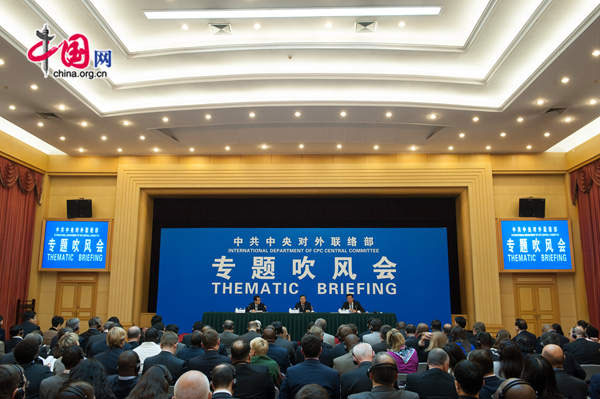Diplomats in China briefed on 4th Plenum
- By Chen Boyuan
 0 Comment(s)
0 Comment(s) Print
Print E-mail China.org.cn, October 31, 2014
E-mail China.org.cn, October 31, 2014
Some 180 senior diplomats representing 120 foreign countries, including as many as 60 ambassadors, were briefed on the accomplishments of the recently convened Fourth Plenary Session of the 18th Central Committee of the Communist Party of China (CPC) on Thursday, Oct. 30, 2014.
The Decision on Major Issues Concerning Comprehensively Advancing Rule of Law (also referred to as the Decision) that was adopted at the Fourth Plenum has been a concern for the international community, in large part because it acts as a guiding principle for the next stage of China's development.
Yuan Shuhong, the vice director of the Legal Affairs Office at China's State Council, told foreign diplomats that the Decision could be condensed into two highlights: shaping a socialist legal system with Chinese characteristics, and shaping a socialist country ruled by law.
Yuan said that the Fourth Plenum was the first-ever such meeting focused on rule of law in the history of the CPC, also noting that last year's Third Plenum was more concerned with reform.
"The effort to shape a moderately prosperous society in China must gain momentum from reform, a topic discussed in the Third Plenum last year. But reform and rule of law are like two wheels that jointly drive such an effort forward," he said.
A society ruled by law should be a precondition of a law-binding government and country, "otherwise those two terms would simply be empty phrases," said Yuan, addressing the Fourth Plenum’s stance that Party and government leaders at all levels should take the lead in abiding by the law.
The CPC's particular effort to address rule of law is also evident in the intensive anti-corruption campaign that has caused quite a handful of CPC Central Committee members to fall from grace.
Yuan said the CPC's self-cleansing anti-corruption effort has been unseen elsewhere in the world, especially since the current central leadership took office in the autumn of 2012. However, corruption still remains a headache because the government still holds too much power in the allocation of resources.
In response to a question from the Hungarian ambassador to China, Sandor Zoltan Kusai, on how China's political consultative system would help to advance the rule of law, Yuan said that rule of law and democracy are "mutually complementary, otherwise mass democracy would lead to many problems, such as those seen in China's Cultural Revolution."
"This is why we address rational and democratic legislation in advancing rule of law; legislative action will represent the whole nation's wisdom to ensure socialist democracy. And the political advisory body is responsible for gathering opinions from different strata of society before submitting recommendations for the legislature's deliberation," Yuan said.







Go to Forum >>0 Comment(s)